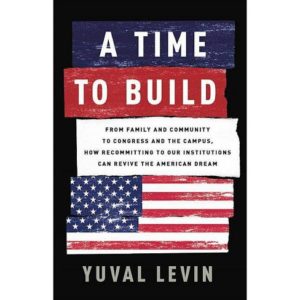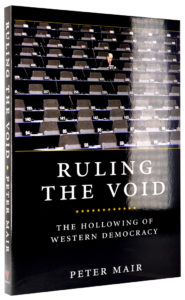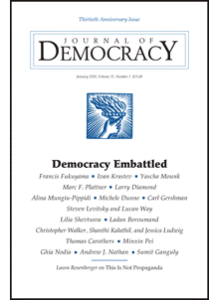 Reviving democracy requires a renewal of core institutions, argues William Galston, a senior fellow in governance studies at the Brookings Institution.
Reviving democracy requires a renewal of core institutions, argues William Galston, a senior fellow in governance studies at the Brookings Institution.
Not only are institutions instruments for accomplishing essential goals, they form our character in ways essential for individual and collective flourishing. When we lose sight of the role that only institutions can play and misconceive them as vehicles for self-interest and self-display, we end up undermining ourselves and others, he writes for The Washington Post, in a review of Yuval Levin’s latest book, “A Time to Build.”
We suffer from our current ills, Levin insists, because we have forgotten why we need institutions, notes Galston, author of “Antipluralism: The Populist Threat to Liberal Democracy:”
We think we want to break free from institutional constraints, but in fact, we yearn for structure and belonging — for institutions to which we can devote ourselves. We demand a politics that breaks down authority when what we really want is a politics that rebuilds authority we can respect. To get this, Levin says, we must “pour ourselves” into our institutions and “let them form us.” This is a stringent demand, because it requires “a kind of devotion, even submission, to institutional formation” that finds its natural home in religious experience.
We need an approach to politics and society that brings together the right’s concern about character and the left’s concern about fairness, adds Galston, a former National Endowment for Democracy (NED) board member. Only institutions whose mission incorporates both can help break our current impasse.
 To renew democracy across the West, we also need to restore voter ties to traditional parties, adds Jeffrey Gedmin, editor-in-chief of The American Interest:
To renew democracy across the West, we also need to restore voter ties to traditional parties, adds Jeffrey Gedmin, editor-in-chief of The American Interest:
Irish political scientist Peter Mair was arguing before his death in 2011 that the decline of political parties was leading to a hollowing out of representative democracy. To revive and sustain themselves, contended Mair, political parties would need to act both responsibly and responsively. … The abdication of elites has gotten us into the current bind, and now a paradox. We trust neither experts nor government. Yet we need expertise and a managerial class to lead us out of our mess. We also need stable, healthy political parties to re-anchor our democracy.
In his eerily prescient book “Ruling the Void,” Mair warned that voter disaffection and disconnected parties were sapping Western democracies, noted Kathleen R. McNamara, professor of government and foreign affairs at Georgetown University and the author of “The Politics of Everyday Europe: Constructing Authority in the European Union.”
The narrowed space for policy contestation led Mair to lament that “the age of party democracy has passed,” analyst Didi Kuo wrote for Vox.
 Sustaining democracy will require rebuilding the legitimate authority of the institutions of liberal democracy, while resisting those powers that aspire to make nondemocratic institutions central, adds Francis Fukuyama. Today, there are two opposite trends in the world, he writes for The Journal of Democracy:
Sustaining democracy will require rebuilding the legitimate authority of the institutions of liberal democracy, while resisting those powers that aspire to make nondemocratic institutions central, adds Francis Fukuyama. Today, there are two opposite trends in the world, he writes for The Journal of Democracy:
- The first is social fragmentation and its concomitant, the decline of the authority of mediating institutions, primarily in established democracies.
- The second is the rise of new centralized hierarchies in authoritarian states.
Surviving the present means rebuilding the legitimate authority of the institutions of liberal democracy, while resisting those powers that aspire to make nondemocratic institutions central, he suggests.
What is democratic innovation for? What and whose interests does it serve? How do different political actors relate to democratic innovation processes? How do these actors engage with experiments that are diffuse in space and time? What are the implications of different innovative experiments for democracy? Questions to be addressed at Innovation and Power: Exploring Democratic Innovation and its Main Actors, a 14-17 April 2020 Forum of the European Consortium on Political Research.
In the current print issue of The American Interest, Gedmin adds, Tyler Cowen explains his optimism for liberalism, democracy, and capitalism, Elisabeth Braw finds evidence of eroding democratic culture, and Karina Orlova sees in the movie Joker warnings of how social media are changing protest and participation.







